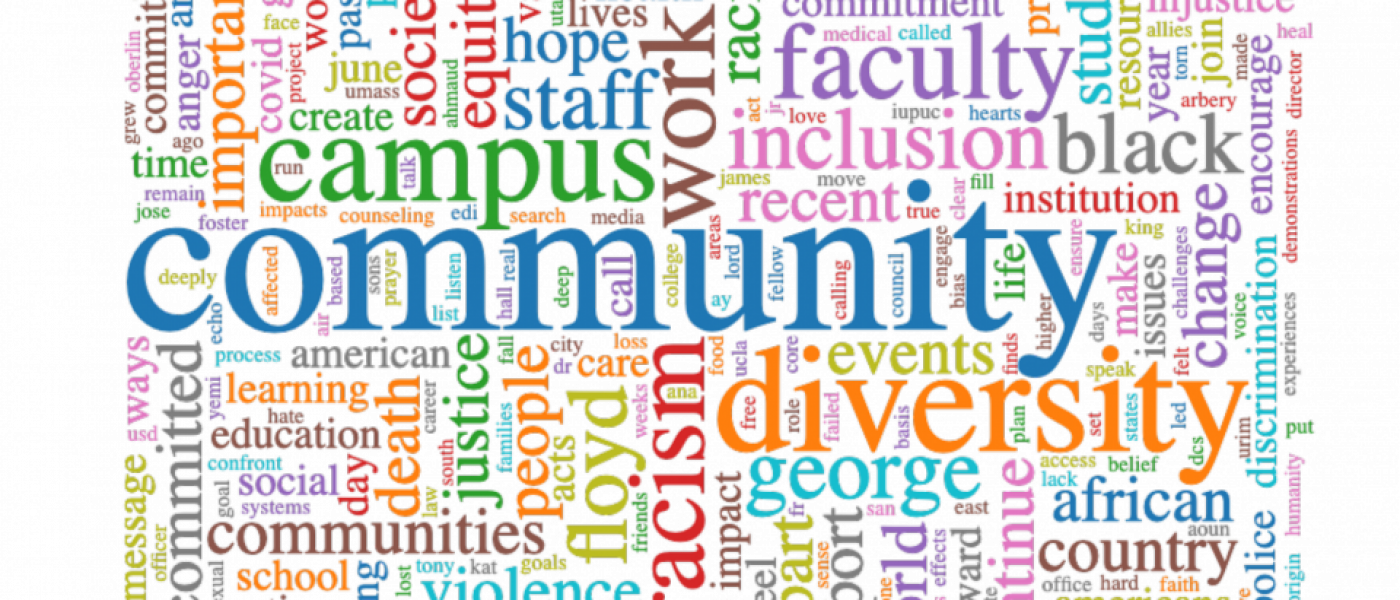At Collaboratory we facilitate a community of practice among the campuses that use our platform, and over the last 6 months we have watched our administrators wrestle with how they can respond, through their professional roles as community engagement scholars and practitioners, to systemic racism and the events of 2020 in general. This gave rise to an anti-racism working group, which has met monthly to reflect and share strategies for moving forward with a plan to stand and fight against systemic racism and work toward agendas promoting a more equitable society.
We decided to look at how Collaboratory institutions committed to anti-racism through their existing institutional missions, as well as through the recent institution-wide statements published in support of anti-racist positions. We employed an open, axial, and selective coding process to identify major themes across the mission and anti-racism statements of 26 institutions.
Institutional Mission Statements
The words most commonly used in institutional mission statements are those you’d likely expect, such as a focus on students, research, learning, as well as diversity, and culture.
While many institutions have made a high-level commitment to equity, diversity, and inclusion, most institutional mission statements did not include an explicit focus on race. They focused on “inclusivity” in general, and heavily relied on their distinguishing characteristics of faith, urban, anchor, etc. to define their work.
There was also an emphasis on cultivating students to be engaged and active citizens.
Anti-Racism Statements
When looking at the statements made by campus leaders following the murder of George Floyd, the most frequent words used within those statements, were community, racism, and diversity (see the image, above). As all institutions acknowledged and firmly denounced systemic racism, many noted specific local events they hosted such as candlelight vigils and days of reflection where their campus paused to mourn and reflect. In most statements a clear connection to the current COVID pandemic was made and the inequitable impact it is having on communities of color. Many institutions shared inspirational words by civil rights or religious leaders while generally calling upon their faculty, staff, and students to get active, speak out, and peacefully protest. Most compelling were the few institutions led by a person of color, who shared their personal experiences with racism and police brutality.
The statements provide evidence that most all institutions are actively thinking about ways to incorporate policies and procedures that are actively anti-racist. The statements are heavily grounded in an internal institutional response, as changes to infrastructure, policies, and procedures featured prominently. Though this response is absolutely needed, it was intriguing to find that only 2 institutions clearly articulated community engagement as a strategic response to this crisis.
As higher education begins to shift away from reflection and towards action, examples of how anti-racist work actually manifests through community-university partnerships will be critical to help position – through research and action – higher education’s role in developing a more just and equitable society for all. This review of institutional mission and anti-racism statements has laid the foundation and acknowledges the need for a clearer understanding of what anti-racist community engagement is, and the criteria that comprises it. A more explicit articulation of anti-racist community engagement will allow institutions to better understand how their engagement already contributes to or possibly hinders anti-racist endeavors so they may begin to take actionable steps towards change.
As higher education begins to shift away from reflection and towards action, examples of how anti-racist work actually manifests through community-university partnerships will be critical to help position – through research and action – higher education’s role in developing a more just and equitable society for all. This review of institutional mission and anti-racism statements has laid the foundation and acknowledges the need for a clearer understanding of what anti-racist community engagement is, and the criteria that comprises it. A more explicit articulation of anti-racist community engagement will allow institutions to better understand how their engagement already contributes to or possibly hinders anti-racist endeavors so they may begin to take actionable steps towards change.
Check back soon for updates on our Anti-Racism Research Fellow, whose work will explore the intersection of community engagement and anti-racism in higher education.
